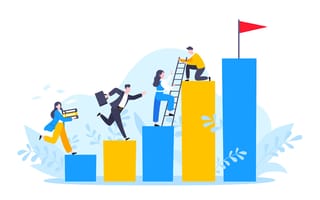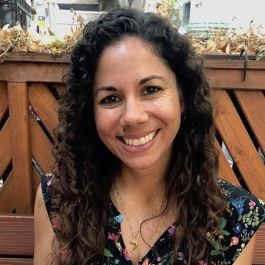New hires at private equity company CB Insights are paired with experienced team members who guide them through onboarding. But in the end, those relationships go beyond the first few weeks.
“These pairings end up being particularly strong working relationships, and we think it’s a really important part of building healthy and high-performing engineering teams over time,” Alex Webb, director of engineering, said.
That’s because mentorship isn’t just an onboarding perk at CB Insights. “It’s a core cultural value of continuously investing in people and giving them the guidance and resources to help them thrive,” Webb said.
Webb himself actively lives that value. He regularly meets with team members to share knowledge and to give them a space to voice ideas and questions. Building a culture around mentorship, like Webb has, is key to an effective professional development program, according to management consulting company Robert Half International. But the key to building that culture is an empathetic team environment.
“Even the best mentoring programs are unlikely to achieve intended outcomes when the surrounding workplace is competitive and individualistic,” W. Brad Johnson, a professor of psychology in the U.S. Naval Academy, and David Smith, an associate professor at Johns Hopkins Carey Business School, wrote for Harvard Business Review.
Guidelines for writing, reviewing and shipping code at healthtech company Thirty Madison emphasize understanding and collaboration. Elizabeth Salazar, senior engineering manager, reviews those guidelines with every person who joins the teams so they are familiar with what she calls “the emotional aspects of code review.” Salazar’s emphasis on empathy and her efforts to cultivate it have helped the engineering team get new members up to speed following a merger.
“We’ve created a warm, supportive atmosphere that has allowed us to onboard new colleagues into that culture quickly and ensure they follow the same practice of empathy as we grow even more,” Salazar said.
And that’s exactly how a culture of mentorship pays off at fast-growing New York tech companies.
CB Insights uses machine learning, algorithms, data and visualizations to help companies learn about growth, competition and the markets and technologies of the future.
What’s a practice your team follows that encourages a culture of mentorship and knowledge-sharing?
New team members at CB Insights are paired with an onboarding buddy for their first few weeks. Their mentor is typically someone who knows the ins and outs and who can help the new team member have a great experience right out of the gate. Mentors will make introductions, recommend Slack channels that are fun or relevant to them, and serve as another dedicated point of contact to offer guidance and make sure new team members have everything they need.
We see this as a great opportunity for established engineers to build mentorship skills. Engineers serving as onboarding buddies for new hires help assign and walk them through their first few work projects; they guide them through the process from initial checkout to code review and deployment.
How do you serve as a mentor to members of your team?
I keep in close contact with the engineers and engineering managers I serve and meet with them regularly to help in any way I can. That means offering guidance when weighing architectural decisions, providing additional business or operational context to their current work, or encouraging them to take on ambitious long-term goals to grow their skills and broaden their impact.
In one of those discussions, an engineer wanted to introduce typing to our frontend code via TypeScript — no small feat given that it was years worth of untyped code — but assumed it was impossible since the idea didn’t gain traction in the past. We dug into why it hadn’t worked before and developed a new approach. We planned to start with a small working group and complete phases of incremental improvements with easy wins frontloaded. We pushed forward on it at a sustainable pace. That strategy ended up being very successful: CB Insights is now very much a TypeScript shop, and it is a major accomplishment for that engineer.
There’s always something new to take advantage of.’’
What formal mentorship programs does CB Insights offer?
In addition to the onboarding buddy program and regular one-on-ones with team leaders, the people team at CB Insights offer frequent learning opportunities and mentorship resources. There’s always something new to take advantage of. Employees can regularly meet with a dedicated outside coach or receive on-demand outside coaching, and we offer training sessions on networking, giving effective feedback and decision-making frameworks.
Thirty Madison is building a healthcare company for people with chronic health conditions. Its proprietary platform and brands combine specialist healthcare with the convenience of telemedicine.
What’s a practice your team follows that encourages a culture of mentorship and knowledge-sharing?
Our comprehensive set of code review guidelines emphasize empathy and collaboration. This includes recognizing there is a real human being on the other end of the screen who is trying their best to write good code. We work to treat every team member with respect and always assume best intentions. The guidelines remind engineers to be cognizant of the power dynamics that naturally exist between engineers — whether due to seniority, gender, culture, or any other difference between two individuals — and to think about the impact their words have.
By emphasizing empathy and compassion during code review and maintaining high standards for shipping code, we build a culture of trust and support. Being wrong is not a reflection of character but rather a growth opportunity, and everyone helps each other be the best engineer they can be.
Being wrong is not a reflection of character but rather a growth opportunity.”
How do you serve as a mentor to members of your team?
I lead by example, particularly when it comes to engaging in a remote environment, which can be challenging. I try to demo different types of engagement, like being active in Slack, joining group events and giving talks to colleagues and planning events. I also help set up opportunities for my team to engage directly.
Thirty Madison recently merged with Nurx. On the first day of merging, there was an opportunity for both engineering teams to give tech talks to each other, and I volunteered. We are now a few months in, and there is another round of tech talks happening. One of my reports will present and is even encouraging his colleague — another of my reports and a new hire — to present as well.
How has a mentorship culture helped your team grow?
Creating a culture of mentorship and support has helped us tremendously. My team has historically been very small, and team members are some of the only owners of a great deal of highly-specific product information. We have had to get new engineers up to speed very quickly on a specific domain and prepare them to handle questions from stakeholders. Now, our team has very quickly tripled in size. We’ve created a warm, supportive atmosphere that has allowed us to onboard new colleagues into that culture quickly and ensure they follow the same practice of empathy as we grow even more.
SIMON’s platform simplifies the investment landscape with tools that make it easier to navigate and manage a wide range of products.
What’s a practice your team follows that encourages a culture of mentorship and knowledge-sharing?
We foster a supportive team environment where mistakes are seen as learning opportunities, not failures. Everyone has the capacity to continue learning. Team members discuss new tools that are being built, which gives everyone a firm grasp on the concepts and enables them to confidently field questions they receive. We also encourage the practice of sharing and circulating knowledge to empower the entire team to keep moving on a project, even when subject matter experts are away. In support of a scalable knowledge-sharing model, we document processes and systems as much as we can and maintain a list of primary and secondary contacts. New joiners are paired with senior mentors to assist their acclimation to SIMON. We empower all team members to take additional steps in their own development. This can look like someone who starts at SIMON working on cloud infrastructure and eventually moves to site reliability or another asset class. We offer opportunities that allow our employees to shine by keeping them challenged, engaged, and continuously learning.
We offer opportunities that allow our employees to shine.”
How do you serve as a mentor to members of your team?
When a new employee joins my team, I share everything I know with them. If they walk away from an interaction and only take away 20 percent of the concept, that is 20 percent more than what they understood to start, and we continue to meet until they fully grasp it. I also encourage conversations about what each team member is interested in so that we can tailor their workload to their interests to keep them excited and engaged.
I do not immediately put new team members on a specific system to give them time to learn, ask questions and fully comprehend each concept so they have the foundation to be successful. I keep meetings short — 30 minutes or less — because people tend to lose focus and get overwhelmed when they receive too much information at once.
I focus on clear and concise communication. I check daily with everyone on my team, regardless of their seniority, to answer their questions, clarify any concepts and generally share the knowledge I’ve accumulated.
How has a mentorship culture helped your team grow?
We embody a mentorship culture across SIMON. Our platform and the systems that run it are complex; even after a year on the team, it is difficult to know everything about every system. We teach new employees from the ground up, including the tools we utilize, the way SIMON works, and our infrastructure. Then, they can confidently understand issues and answer questions. This is only possible because of the culture of mentorship that has been carefully cultivated across all the teams at SIMON.
We have written our code in such a way that our employees learn the SIMON systems and continue to broaden their skill sets in general. We want our employees to be well-rounded individuals. The technology industry evolves quickly. We encourage our employees to stay ahead of the curve and learn skills that the market demands and try different things to broaden their knowledge. Because of these opportunities, our employees are encouraged to take part in their own development.











